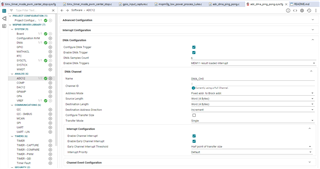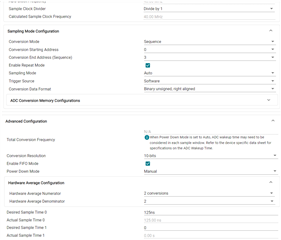Tool/software:
Hi,
I have a Launchpad 3507. When I load the adc ping pong example and add a check for an MEMRESx Overflow, it'll be set directly.
Any ideas why that happens?
This is the modified example, added the global flag and removed the breakpoint (I know that a breakpoint will result in an overflow). Run it and have gOverflow added to the watch
/*
* Copyright (c) 2021, Texas Instruments Incorporated
* All rights reserved.
*
* Redistribution and use in source and binary forms, with or without
* modification, are permitted provided that the following conditions
* are met:
*
* * Redistributions of source code must retain the above copyright
* notice, this list of conditions and the following disclaimer.
*
* * Redistributions in binary form must reproduce the above copyright
* notice, this list of conditions and the following disclaimer in the
* documentation and/or other materials provided with the distribution.
*
* * Neither the name of Texas Instruments Incorporated nor the names of
* its contributors may be used to endorse or promote products derived
* from this software without specific prior written permission.
*
* THIS SOFTWARE IS PROVIDED BY THE COPYRIGHT HOLDERS AND CONTRIBUTORS "AS IS"
* AND ANY EXPRESS OR IMPLIED WARRANTIES, INCLUDING, BUT NOT LIMITED TO,
* THE IMPLIED WARRANTIES OF MERCHANTABILITY AND FITNESS FOR A PARTICULAR
* PURPOSE ARE DISCLAIMED. IN NO EVENT SHALL THE COPYRIGHT OWNER OR
* CONTRIBUTORS BE LIABLE FOR ANY DIRECT, INDIRECT, INCIDENTAL, SPECIAL,
* EXEMPLARY, OR CONSEQUENTIAL DAMAGES (INCLUDING, BUT NOT LIMITED TO,
* PROCUREMENT OF SUBSTITUTE GOODS OR SERVICES; LOSS OF USE, DATA, OR PROFITS;
* OR BUSINESS INTERRUPTION) HOWEVER CAUSED AND ON ANY THEORY OF LIABILITY,
* WHETHER IN CONTRACT, STRICT LIABILITY, OR TORT (INCLUDING NEGLIGENCE OR
* OTHERWISE) ARISING IN ANY WAY OUT OF THE USE OF THIS SOFTWARE,
* EVEN IF ADVISED OF THE POSSIBILITY OF SUCH DAMAGE.
*/
#include "ti_msp_dl_config.h"
#define ADC_SAMPLE_SIZE (64)
/* When FIFO is enabled 2 samples are compacted in a single word */
#define ADC_FIFO_SAMPLES (ADC_SAMPLE_SIZE / 2)
uint16_t gADCSamplesPing[ADC_SAMPLE_SIZE];
uint16_t gADCSamplesPong[ADC_SAMPLE_SIZE];
volatile bool gCheckADC;
volatile bool gPing;
volatile bool gOverflow;
volatile bool gUnderflow;
int main(void) {
gOverflow = false;
gUnderflow = false;
gPing = true;
SYSCFG_DL_init();
/* Configure DMA source, destination and size */
DL_DMA_setSrcAddr(DMA, DMA_CH0_CHAN_ID, (uint32_t)DL_ADC12_getFIFOAddress(ADC12_0_INST));
DL_DMA_setDestAddr(DMA, DMA_CH0_CHAN_ID, (uint32_t)&gADCSamplesPing[0]);
DL_DMA_setTransferSize(DMA, DMA_CH0_CHAN_ID, ADC_FIFO_SAMPLES);
DL_DMA_enableChannel(DMA, DMA_CH0_CHAN_ID);
/* Setup interrupts on device */
NVIC_EnableIRQ(ADC12_0_INST_INT_IRQN);
gCheckADC = false;
/* The ADC is configured for Repeat Single Conversion,
* so the ADC will continue until DL_ADC12_disableConversions() is called */
DL_ADC12_startConversion(ADC12_0_INST);
while (1) {
while (false == gCheckADC) {
__WFE();
}
/* Breakpoint to check the buffers and watch the Ping Pong operation.
* The data will be alternating between each buffer.
*/
//__BKPT(0);
/* Switch to send ADC Results to Pong Buffer */
if (gPing) {
DL_DMA_setDestAddr(DMA, DMA_CH0_CHAN_ID, (uint32_t)&gADCSamplesPong[0]);
DL_DMA_setTransferSize(DMA, DMA_CH0_CHAN_ID, ADC_FIFO_SAMPLES);
DL_DMA_enableChannel(DMA, DMA_CH0_CHAN_ID);
DL_ADC12_enableDMA(ADC12_0_INST);
gPing = false;
}
/* Switch to send ADC Results to Ping Buffer */
else {
DL_DMA_setDestAddr(DMA, DMA_CH0_CHAN_ID, (uint32_t)&gADCSamplesPing[0]);
DL_DMA_setTransferSize(DMA, DMA_CH0_CHAN_ID, ADC_FIFO_SAMPLES);
DL_DMA_enableChannel(DMA, DMA_CH0_CHAN_ID);
DL_ADC12_enableDMA(ADC12_0_INST);
gPing = true;
}
}
gCheckADC = false;
}
void ADC12_0_INST_IRQHandler(void) {
gOverflow = gOverflow || DL_ADC12_getRawInterruptStatus(ADC12_0_INST,DL_ADC12_INTERRUPT_OVERFLOW);
gUnderflow = gUnderflow || DL_ADC12_getRawInterruptStatus(ADC12_0_INST,DL_ADC12_INTERRUPT_UNDERFLOW);
switch (DL_ADC12_getPendingInterrupt(ADC12_0_INST)) {
case DL_ADC12_IIDX_DMA_DONE:
gCheckADC = true;
break;
default:
break;
}
}




